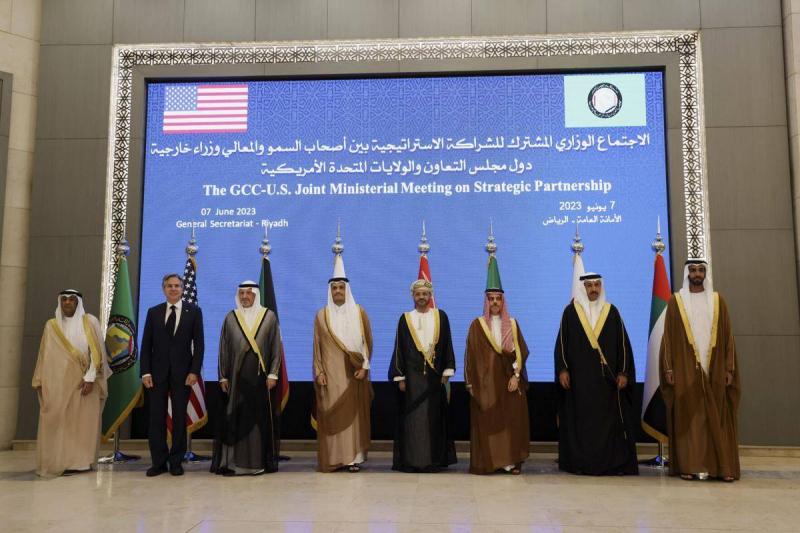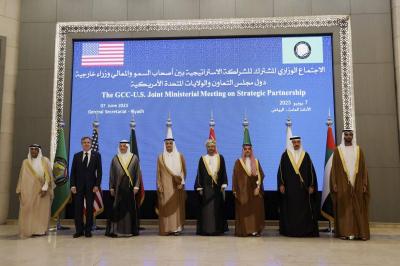On Wednesday, the foreign ministers of the Gulf Cooperation Council (GCC) and U.S. Secretary of State Antony Blinken held talks in Riyadh, Saudi Arabia, discussing increased coordination and joint cooperation on regional and international issues.
The final statement from the meeting confirmed a commitment to supporting diplomacy aimed at de-escalating tensions in the Middle East, as well as supporting efforts by Riyadh and Washington to achieve a ceasefire in Sudan. Both sides pledged to confront "any aggressive actions" that threaten maritime corridors. The statement emphasized the importance of joint efforts to reduce tensions in the region and reiterated the mutual commitment to supporting diplomacy to achieve these goals.
The two sides also agreed on the significance of infrastructure projects in enhancing integration and connectivity in the region, and the necessity of upholding navigation rights and freedoms and collective efforts to address threats to the security of vessels in maritime passages. The ministers stressed the "importance of combatting terrorism and violent extremism worldwide" and welcomed the ministerial meeting of the Global Coalition to Defeat ISIS, set to be held in Riyadh on June 8.
Additionally, Blinken affirmed "the United States' enduring commitment to the security of the region, recognizing its vital role in the global economy and international trade," according to the statement.
Regarding Iran, the GCC and the United States reaffirmed their commitment to freedom of navigation and maritime security in the region. They expressed "determination to confront any aggressive or unlawful actions at sea or elsewhere that threaten maritime passages, international trade, and oil facilities in GCC states." They also called on Iran for "full cooperation" with the International Atomic Energy Agency, emphasizing support for the Non-Proliferation Treaty.
The statement welcomed Saudi Arabia and Iran's decision to restore diplomatic relations, stressing "the importance of regional countries' adherence to international law, including the United Nations Charter."
On the Yemen issue, the two sides reaffirmed their support for the Presidential Leadership Council in Yemen and urged the Iran-backed Houthi group to "seize this opportunity and capitalize on the relatively calm past 14 months to provide relief to millions of Yemenis." They highlighted the importance of ongoing UN-led peace efforts in Yemen following the April 2022 truce and expressed hope "to see a comprehensive Yemeni-Yemeni political process that leads to a permanent end to the conflict."
The final statement also addressed the Palestinian issue, reaffirming commitment to a just, lasting, and comprehensive peace in the Middle East based on the two-state solution. It emphasized "the necessity of refraining from all unilateral measures that undermine the two-state solution and raise tensions, while maintaining the historical status quo in the holy sites of Jerusalem."
Regarding the Syrian crisis, the statement welcomed "Arab efforts to resolve the crisis step-by-step," reiterating commitment to achieving a "political solution to the Syrian crisis that preserves Syria's unity and sovereignty." Both sides renewed calls for a ceasefire and to create conditions for the return of refugees. They welcomed UN Secretary-General Antonio Guterres' call to renew the Security Council's mandate for 12 months for cross-border operations, supporting the inclusion of currently open border points (Bab al-Hawa, Bab al-Salam, and al-Rai) in a Security Council resolution to be issued in July.
The ministers condemned "all actions" that threaten the safety and security of U.S. forces and coalition troops working to defeat ISIS in Syria.
The talks also touched on Iraq, with the final statement welcoming the positive and growing partnership between the GCC and Iraq, and progress on the electricity interconnection project between Iraq and GCC states. The ministers discussed economic reform efforts in Iraq and efforts to prevent financing terrorism, affirming support for a "secure, stable Iraq with full sovereignty."
Regarding the conflict in Sudan, the ministers expressed concern over the ongoing fighting and reaffirmed support for Saudi and U.S. diplomatic efforts in Jeddah to reach a comprehensive agreement for the full implementation of a short-term ceasefire agreement. They stressed that there is no military solution to end the conflict, renewing their call for Sudanese armed forces and Rapid Support Forces to "silence their weapons."
Finally, concerning the war in Ukraine, the ministers reiterated the importance of respecting the principle of sovereignty and international law, including the United Nations Charter, and "the commitment to abstaining from the use of force or threats against the territorial integrity or political independence of any state." They urged all nations and the international community to ramp up efforts to achieve a peaceful resolution, end the humanitarian crisis, support refugees and displaced persons, and facilitate the export of grains and other food supplies, aiding food security in affected countries.




